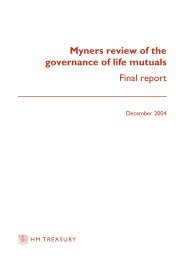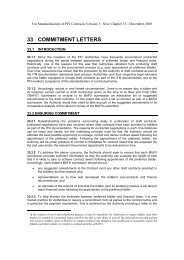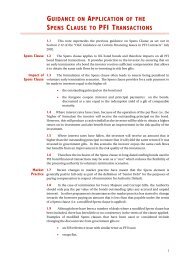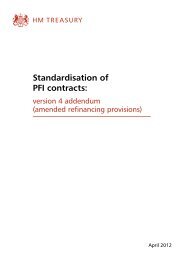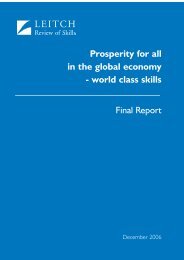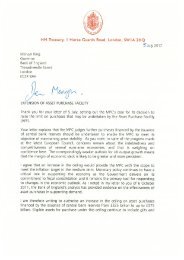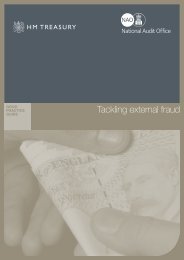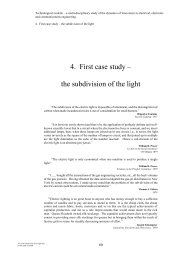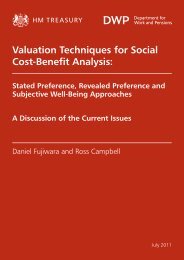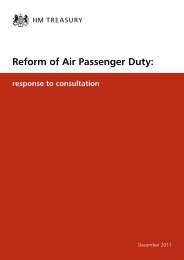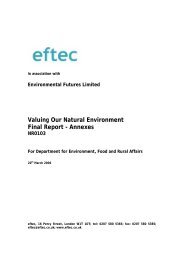a summary of the findings of the penrose inquiry into ... - HM Treasury
a summary of the findings of the penrose inquiry into ... - HM Treasury
a summary of the findings of the penrose inquiry into ... - HM Treasury
You also want an ePaper? Increase the reach of your titles
YUMPU automatically turns print PDFs into web optimized ePapers that Google loves.
A<br />
SUMMARY OF THE FINDINGS OF THE<br />
PENROSE INQUIRY INTO EQUITABLE LIFE<br />
A.1 In his report Lord Penrose exposes a number <strong>of</strong> lessons to be learned from <strong>the</strong><br />
events at Equitable Life, which is among <strong>the</strong> largest mutual life <strong>of</strong>fices in <strong>the</strong> UK. In<br />
doing so he is clear that, while some <strong>of</strong> <strong>the</strong> specific issues he addresses are peculiar to<br />
past events at Equitable Life,<br />
“There is, however, nothing in <strong>the</strong> structure <strong>of</strong> a mutual life <strong>of</strong>fice to prevent a<br />
similar problem emerging.” (chapter 9, paragraph 196).<br />
A.2 There was, in his view, ineffective scrutiny and challenge <strong>of</strong> <strong>the</strong> executive <strong>of</strong> <strong>the</strong><br />
Society:<br />
“The critical responsibilities for valuing liabilities, assessing <strong>the</strong> liability<br />
implications <strong>of</strong> new products, and identifying and monitoring risk generally were<br />
discharged by a discrete part <strong>of</strong> <strong>the</strong> organisation that was not subject to effective<br />
scrutiny or challenge.” (chapter 20, paragraph 50)<br />
THE ROLE OF THE BOARD<br />
A.3 The report highlights <strong>the</strong> characteristics <strong>of</strong> Equitable’s Board during <strong>the</strong> period<br />
covered by <strong>the</strong> <strong>inquiry</strong>, noting that at critical points in <strong>the</strong> Society’s history it<br />
“…had insufficient knowledge and skills to provide an effective challenge to <strong>the</strong><br />
executive in critical areas.” (chapter 19, paragraph 240).<br />
As a consequence:<br />
“…<strong>the</strong> Board’s dependence on actuarial advice was total. None <strong>of</strong> <strong>the</strong> nonexecutive<br />
directors had relevant life <strong>of</strong>fice experience or relevant qualifications.”<br />
(chapter 9, paragraph 30).<br />
More specifically:<br />
“None <strong>of</strong> <strong>the</strong> non-executive members <strong>of</strong> <strong>the</strong> Board had relevant skills or<br />
experience <strong>of</strong> actuarial principles or methodologies” (chapter 19, paragraph 89).<br />
A.4 The Board also failed, according to Lord Penrose, to put in place appropriate<br />
mechanisms to see that it had <strong>the</strong> information and advice to exercise its responsibilities:<br />
“The Board relied on reports made directly to <strong>the</strong>m by <strong>the</strong> Society’s senior<br />
actuarial staff…without instituting and maintaining any committee system to<br />
consider in detail and report on actuarial management.”(chapter 19, paragraph<br />
104).<br />
As a consequence:<br />
“…<strong>the</strong> Board was never fully advised <strong>of</strong> <strong>the</strong> financial implications <strong>of</strong> <strong>the</strong><br />
decisions that were said to be open to <strong>the</strong>m.” (chapter 19, paragraph 84).<br />
Myners review <strong>of</strong> <strong>the</strong> governance <strong>of</strong> life mutuals: final report
A S UMMARY OF THE FINDINGS OF THE P ENROSE INQUIRY INTO EQUITABLE LIFE<br />
A.5 He also raises interesting questions about <strong>the</strong> relationship between <strong>the</strong> Board<br />
and specialist members <strong>of</strong> <strong>the</strong> executive, as well as <strong>the</strong> extent to which non-executive<br />
directors can, or should be expected to, gain a true understanding <strong>of</strong> a complex<br />
business such as Equitable Life:<br />
“The Board at no stage got fully to grips with <strong>the</strong> financial situation faced by <strong>the</strong><br />
Society: information was too fragmented, <strong>the</strong>ir collective skills were inadequate<br />
for <strong>the</strong> task, and <strong>the</strong>re were no effective arrangements for ensuring that <strong>the</strong>re was<br />
detailed examination <strong>of</strong>, and onward reporting to <strong>the</strong> Board on, actuarial reports.<br />
Equitable’s non-executive directors were so wholly dependent on actuarial input<br />
from <strong>the</strong> executive and in particular from <strong>the</strong> chief executive/actuary that <strong>the</strong>y<br />
were largely incapable <strong>of</strong> exercising any influence on <strong>the</strong> actuarial management<br />
<strong>of</strong> <strong>the</strong> society.” (chapter 20, paragraph 50).<br />
He reports that Equitable’s own non-executives made <strong>the</strong> point that:<br />
“…as generalist non-executive directors, <strong>the</strong> individuals in question were<br />
incapable <strong>of</strong> addressing independently such fundamental aspects <strong>of</strong> <strong>the</strong> firm’s<br />
business as its actuarial management and liability valuation.” (chapter 20,<br />
paragraph 53).<br />
THE ROLE OF POLICYHOLDERS<br />
A.6 The report also asserts that <strong>the</strong> Board itself was not subject to effective external<br />
scrutiny or discipline. In doing so, it compares <strong>the</strong> situation <strong>of</strong> mutual life <strong>of</strong>fices with<br />
<strong>the</strong> position <strong>of</strong> proprietary firms:<br />
“In <strong>the</strong> case <strong>of</strong> proprietary firms, <strong>the</strong> primary responsibility for <strong>the</strong> selection <strong>of</strong><br />
directors and calling <strong>the</strong> board to account for its direction <strong>of</strong> <strong>the</strong> business must<br />
continue to rest with <strong>the</strong> shareholders <strong>of</strong> <strong>the</strong> company, whose capital stands at<br />
risk in <strong>the</strong> event <strong>of</strong> mis-management. However, <strong>the</strong> position is different for a<br />
mutual like Equitable, where it is <strong>the</strong> policyholders who are <strong>the</strong> source <strong>of</strong> <strong>the</strong> risk<br />
capital for <strong>the</strong> enterprise.” (chapter 20, paragraph 51).<br />
A.7 Although <strong>the</strong>y were <strong>the</strong> owners <strong>of</strong> <strong>the</strong> Society, it was difficult for policyholders to<br />
call <strong>the</strong> board to account:<br />
“Under <strong>the</strong> Society’s articles policyholders were effectively powerless, and <strong>the</strong><br />
Board was a self-perpetuating oligarchy amenable to policyholder pressure only<br />
at its discretion.” (chapter 20, paragraph 51).<br />
Contributing to <strong>the</strong> problem was <strong>the</strong> complexity <strong>of</strong> policyholders’ relationship with<br />
Equitable Life. Not all policyholders were members, and <strong>the</strong>ir status as members could<br />
change over time:<br />
“…<strong>the</strong> relationship between <strong>the</strong> members and <strong>the</strong> company is unique. A basic<br />
characteristic <strong>of</strong> mutual business is <strong>the</strong> identification <strong>of</strong> membership <strong>of</strong> <strong>the</strong><br />
company with <strong>the</strong> contractual relationship between <strong>the</strong> holders <strong>of</strong> participating<br />
contracts and <strong>the</strong> <strong>of</strong>fice already mentioned. Membership is typically defined in<br />
terms <strong>of</strong> participation in <strong>the</strong> pr<strong>of</strong>its <strong>of</strong> <strong>the</strong> distributable surplus <strong>of</strong> <strong>the</strong> <strong>of</strong>fice. Nonparticipating<br />
contracts, for example a fully guaranteed policy providing a fixed<br />
obligation to pay a specified sum <strong>of</strong> money on a contingency, and linked contracts<br />
may not qualify <strong>the</strong> policyholder for membership. Policyholders may be members<br />
or may be creditors <strong>of</strong> <strong>the</strong> company or both, with those relationships arising from<br />
Myners review <strong>of</strong> <strong>the</strong> governance <strong>of</strong> life mutuals: final report
SUMMARY OF THE FINDINGS OF THE P ENROSE INQUIRY INTO E QUITABLE LIFE A<br />
<strong>the</strong>ir policies and defined in <strong>the</strong> constituent documents <strong>of</strong> <strong>the</strong> <strong>of</strong>fice by reference to<br />
those policies. This makes <strong>the</strong> application <strong>of</strong> common rules and principles <strong>of</strong><br />
governance difficult.” (chapter 9, paragraph 13).<br />
THE ROLE OF THE FSA<br />
A.8 Lord Penrose acknowledges that <strong>the</strong> FSA’s work:<br />
“…has sought to anticipate many <strong>of</strong> <strong>the</strong> lessons that might be drawn by this<br />
<strong>inquiry</strong>, and it should come as no surprise that it has largely succeeded in that.”<br />
(chapter 20, paragraph 3).<br />
A.9 He none<strong>the</strong>less envisages some fur<strong>the</strong>r scope for <strong>the</strong> FSA to be involved in<br />
improving <strong>the</strong> effectiveness <strong>of</strong> <strong>the</strong> boards <strong>of</strong> life mutuals. In particular he suggests <strong>the</strong><br />
Adding that:<br />
“FSA consider how <strong>the</strong>ir powers may be exercised to address <strong>the</strong> problem <strong>of</strong><br />
unbalanced or ineffective boards.”<br />
“…<strong>the</strong> regulators should be confident that where necessary <strong>the</strong>y are able to require<br />
changes to <strong>the</strong> board to address major gaps or imbalances in directors’ collective<br />
skills or experience.” (chapter 20, paragraph 52).<br />
A.10 Lord Penrose identifies a need to improve participation by policyholders, but<br />
sees:<br />
“…no ready means by which regulators could force <strong>the</strong> remaining mutuals to<br />
adopt articles that facilitated policyholder action” (chapter 20, paragraph 54).<br />
A.11 He speculates that, to protect policyholders’ interests, <strong>the</strong> FSA’s role might be<br />
extended:<br />
“…it might be acceptable for <strong>the</strong> regulator to have power to appoint from a panel<br />
<strong>of</strong> experts an adviser to <strong>the</strong> board <strong>of</strong> a life <strong>of</strong>fice in case <strong>of</strong> need, with access to all<br />
board papers and to <strong>the</strong> board itself, and with power to report to FSA on<br />
management. This would fall short <strong>of</strong> <strong>the</strong> formal appointment <strong>of</strong> an independent<br />
reporter. It could be more flexible. And if it failed to produce results FSA’s<br />
subsequent formal action would be facilitated. A power to report to FSA ra<strong>the</strong>r<br />
than an obligation would improve <strong>the</strong> prospects <strong>of</strong> acceptance <strong>of</strong> <strong>the</strong> adviser as a<br />
source <strong>of</strong> support to <strong>the</strong> board ra<strong>the</strong>r than a threat to current management. An<br />
occasion for <strong>the</strong> appointment <strong>of</strong> such an adviser would be recognition <strong>of</strong> a risk<br />
that <strong>the</strong> firm might be in danger <strong>of</strong> failing in its obligation to treat policyholders<br />
fairly.” (chapter 20, paragraph 55).<br />
Though he recognises that:<br />
“There would be resistance to direct involvement <strong>of</strong> regulation in management for<br />
understandable reasons.” (chapter 20, paragraph 55).<br />
Myners review <strong>of</strong> <strong>the</strong> governance <strong>of</strong> life mutuals: final report
B LIST OF MUTUAL LIFE OFFICES<br />
Firms incorporated by Special Act or Royal Charter 1<br />
Standard Life Assurance Company *<br />
Wesleyan Assurance Society *<br />
Customs Annuity and Benevolent Fund Incorporated *<br />
Companies Act companies<br />
(Companies limited by guarantee)<br />
Marine and General Mutual Life Assurance Society *<br />
The Royal London Mutual Insurance Society Limited *<br />
Reliance Mutual Insurance Society Limited *<br />
CUNA Mutual Insurance Society *<br />
National Farmers' Union Mutual Insurance Society Limited *<br />
London Aberdeen and Nor<strong>the</strong>rn Mutual Assurance Society Limited *<br />
Society for <strong>the</strong> Benefit <strong>of</strong> <strong>the</strong> Widows <strong>of</strong> <strong>the</strong> Officers and Warrant Officers <strong>of</strong> <strong>the</strong> Royal<br />
Regiment <strong>of</strong> Artillery Limited *<br />
Companies Act company (Unlimited liability)<br />
The Equitable Life Assurance Society *<br />
Companies incorporated under <strong>the</strong> Industrial &<br />
Provident Act<br />
Co-operative Insurance Society Limited *<br />
UIA (Insurance) Limited *<br />
Directive Friendly Societies<br />
British Benefits Friendly Society Limited *<br />
Cirencester Friendly Society Limited *<br />
Communication Workers Friendly Society Limited *<br />
Dentists' and General Mutual Benefit Society Ltd *<br />
Dentists' Provident Society Limited *<br />
Esano London *<br />
Family Assurance Friendly Society Limited *<br />
1 The <strong>of</strong>fices marked with an asterix are on <strong>the</strong> Standard & Poor’s Syn<strong>the</strong>sis Life database. The list is correct as at <strong>the</strong> end <strong>of</strong><br />
2003.<br />
Myners review <strong>of</strong> <strong>the</strong> governance <strong>of</strong> life mutuals: final report
B L IST OF MUTUAL LIFE OFFICES<br />
Hearts <strong>of</strong> Oak Friendly Society Limited *<br />
Homeowners Friendly Society Limited *<br />
Liverpool Victoria Friendly Society Limited *<br />
Metropolitan Police Friendly Society Limited *<br />
National Deposit Friendly Society Limited *<br />
Pioneer Friendly Society Limited *<br />
Police Mutual Assurance Society Limited *<br />
Royal Liver Assurance Limited *<br />
Scottish Friendly Assurance Society Limited *<br />
Scottish Legal Life Assurance Society Limited *<br />
Teachers Provident Society Limited *<br />
The Ancient Order <strong>of</strong> Foresters Friendly Society Limited *<br />
The Pension Annuity Friendly Society Limited *<br />
The Shepherds Friendly Society Limited *<br />
Transport Friendly Society Limited *<br />
Tunbridge Wells Equitable Friendly Society Ltd (renamed The Children’s Mutual in<br />
2004) *<br />
Tunstall Assurance *<br />
Non-directive friendly societies<br />
Anglo-Saxons Friendly Society<br />
Braemar Royal Highland Society<br />
Bus Employees' Friendly Society<br />
Choir Benevolent Fund<br />
Compass Friendly Society Limited *<br />
Coventry Assurance Society<br />
Druids Sheffield Friendly Society<br />
Goodyear Relief Society<br />
Grand Lodge <strong>of</strong> <strong>the</strong> United Kingdom Independent Order <strong>of</strong> English Mechanics Friendly<br />
Society (Preston Unity)<br />
Grand United Order <strong>of</strong> Oddfellows Friendly Society<br />
Health Shield Friendly Society *<br />
Hunt Servants' Benefit Society<br />
Independent Order <strong>of</strong> Oddfellows Kingston Unity Friendly Society *<br />
Myners review <strong>of</strong> <strong>the</strong> governance <strong>of</strong> life mutuals: final report
LIST OF MUTUAL LIFE OFFICES B<br />
Independent Order <strong>of</strong> OddFellows Manchester Unity Friendly Society *<br />
Lancashire and Cheshire Miners' Permanent Relief Society<br />
Leek Assurance Collecting Society<br />
Lindsey House *<br />
Lonach Highland and Friendly Society<br />
Merseyside Police Funeral Society<br />
Methodist Ministers' Annuitant Society<br />
Midland Counties Colliery Officials' and Staff's Friendly Society<br />
Midland District Miners' Fatal Accident Relief Society<br />
Millbrook Permanent Annuitant Society<br />
National Independent Oddfellows Friendly Society<br />
New Tab Friendly Society<br />
Nottingham Oddfellows Assurance Friendly Society Limited *<br />
Pharmaceutical and General Provident Society Ltd *<br />
Preston Operative Assurance Collecting Society<br />
Railway Enginemen's Assurance Society Limited *<br />
Railway Friendly Society<br />
Rational Shelley Friendly Society Limited *<br />
Ronald Moore Sickness and Benevolent Association<br />
Royal Standard Friendly Society<br />
Sheffield Mutual Friendly Society<br />
Sons <strong>of</strong> Temperance Friendly Society<br />
South Yorkshire Police Benevolent Friendly Society<br />
St Andrew's Society <strong>of</strong> Aberdeen<br />
St John's Burial Society Burscough Bridge<br />
Staffordshire Police Widows' and Benevolent Fund Friendly Society<br />
Teesside Workmen's Welfare Fund Friendly Society<br />
The Church Burial Society <strong>of</strong> St Alban <strong>the</strong> Martyr, Holborn<br />
The Ideal Benefit Society *<br />
The Kensington Friendly Collecting Society Ltd *<br />
The London Midland and Scottish Railway Running Department Insurance Society<br />
The National Bank Staff Life Assurance (London) Society<br />
Myners review <strong>of</strong> <strong>the</strong> governance <strong>of</strong> life mutuals: final report
B L IST OF MUTUAL LIFE OFFICES<br />
The Original Holloway Friendly Society Limited *<br />
The Ramsbottom Friendly Burial Society<br />
The Rechabite Friendly Society Limited *<br />
The Red Rose Friendly Society Limited<br />
The Schoolteachers Friendly Society *<br />
United General Sea Box <strong>of</strong> Borrowstounness Friendly Society<br />
Universal Bro<strong>the</strong>rhood <strong>of</strong> Speculative Mechanics<br />
Widow & Orphan Fund <strong>of</strong> <strong>the</strong> Woolwich District<br />
Wiltshire Friendly Society Limited *<br />
Myners review <strong>of</strong> <strong>the</strong> governance <strong>of</strong> life mutuals: final report
C<br />
ECONOMIC RELEVANCE OF THE LIFE<br />
MUTUAL SECTOR<br />
Table C.1: Table <strong>of</strong> life demutualisations 1<br />
Mutual Office Date Premiums (€m,<br />
1998)<br />
Scottish Mutual 1992 1,594 Abbey National<br />
Scottish Equitable 1993 4,312 Aegon<br />
Provident Mutual 1995 800 General Accident<br />
Clerical Medical 1996 4,098 Halifax<br />
Scottish Amicable 1997 877 Prudential<br />
Norwich Union 1997 8,661 Flotation<br />
NPI 1999 1,957 AMP<br />
Scottish Widows 2000 3,549 Lloyds TSB<br />
Scottish Provident 2001 1,421 Abbey National<br />
Scottish Life 2001 1,312 Royal London<br />
Friends Provident 2001 3,099 Flotation<br />
National Mutual 2001 752 GE Capital<br />
DETAILED DATA ON MUTUAL AND PROPRIETARY LIFE<br />
OFFICES<br />
C.1 The data in <strong>the</strong> below tables was provided by <strong>the</strong> Centre for Risk and Insurance<br />
Studies at <strong>the</strong> Nottingham University Business School. The data was derived from<br />
Standard & Poor’s Syn<strong>the</strong>sys database and refers to 31 December 2003. The data<br />
represents 53 <strong>of</strong> <strong>the</strong> 91 mutual life <strong>of</strong>fices in <strong>the</strong> UK, and excludes only <strong>the</strong> small, nondirective<br />
friendly societies. Annex B contains a list <strong>of</strong> all 91 <strong>of</strong>fices.<br />
Table C.2: Data comparing mutual and proprietary life <strong>of</strong>fices<br />
All mutual life<br />
<strong>of</strong>fices<br />
All friendly<br />
societies<br />
Non-directive<br />
friendly societies<br />
Proprietary life<br />
companies<br />
Assets (£bn) 161,027,858 16,094,208 489,142 815,169,340<br />
Premiums UK<br />
(£bn)<br />
13,251,235<br />
1,113,659 32,922<br />
93,092,658<br />
New business APE<br />
UK (£bn)<br />
Proportion <strong>of</strong> new<br />
1,557,873<br />
122,733 3,197<br />
10,255,666<br />
business that is<br />
with-pr<strong>of</strong>its<br />
Proportion <strong>of</strong><br />
30.28% 59.71% 55.00% 6.53%<br />
liabilities that is<br />
with-pr<strong>of</strong>its<br />
55.48% 67.03% 36.64% 33.87%<br />
1 Source: ICMIF, “Valuing Our Mutuality”.<br />
Myners review <strong>of</strong> <strong>the</strong> governance <strong>of</strong> life mutuals: final report
C E CONOMIC RELEVANCE OF THE LIFE MUTUAL SECTOR<br />
Table C.3: Life mutual sector as a proportion <strong>of</strong> <strong>the</strong> total life market<br />
All mutual life<br />
<strong>of</strong>fices<br />
Myners review <strong>of</strong> <strong>the</strong> governance <strong>of</strong> life mutuals: final report<br />
All friendly<br />
societies<br />
Non-directive<br />
friendly societies<br />
Assets 16.45% 1.64% 0.05%<br />
Premiums UK 12.43% 1.04% 0.03%<br />
New business premiums 13.12% 1.03% 0.03%<br />
With-pr<strong>of</strong>its liabilities 23.50% 2.67% 0.03%
D<br />
DRAFT ANNOTATED COMBINED CODE<br />
FOR LIFE MUTUALS<br />
Myners review <strong>of</strong> <strong>the</strong> governance <strong>of</strong> life mutuals: final report
Introduction<br />
The Combined Code on Corporate Governance<br />
An Annotated Version for Mutual Life Insurers<br />
This document is a copy <strong>of</strong> <strong>the</strong> July 2003 version <strong>of</strong> <strong>the</strong> Combined Code on<br />
Corporate Governance to which annotations have been added. The<br />
annotations, as with this Introduction, are given in boxes. The original text <strong>of</strong><br />
<strong>the</strong> Code itself has not been amended. It does not, however, include <strong>the</strong><br />
additional material appended to <strong>the</strong> full Combined Code under <strong>the</strong> heading<br />
Related Guidance and Good Practice Suggestions and Useful Web Links.<br />
The Related Guidance and Good Practice Suggestions includes Guidance<br />
on internal control (The Turnbull Guidance), Guidance on audit committees<br />
(The Smith Guidance) and Suggestions for good practice from <strong>the</strong> Higgs<br />
report. The original version <strong>of</strong> <strong>the</strong> Combined Code including this additional<br />
material can be found at http://www.frc.org.uk/corporate/.<br />
The guidance in this document, which comprises this Introduction and <strong>the</strong><br />
annotations, is intended to assist life mutuals in having regard to <strong>the</strong><br />
Combined Code on Corporate Governance <strong>of</strong> July 2003. The annotations<br />
follow a ‘by exception’ approach, in that <strong>the</strong>y are given only for those<br />
elements <strong>of</strong> <strong>the</strong> Combined Code that ei<strong>the</strong>r raise particular issues for life<br />
mutuals or are not considered to be relevant to life mutuals. All parts <strong>of</strong> <strong>the</strong><br />
Code are regarded as being appropriate in <strong>the</strong>ir present form unless<br />
annotations indicate o<strong>the</strong>rwise. The annotations are not intended to alter <strong>the</strong><br />
principles <strong>of</strong> <strong>the</strong> Code but ra<strong>the</strong>r to promote interpretations that should best<br />
uphold <strong>the</strong>se principles in this sector. Code provisions that are not annotated<br />
should not be regarded as any less important than those that are.<br />
Where <strong>the</strong> Code refers to <strong>the</strong> Board <strong>of</strong> <strong>the</strong> company, this should be taken as<br />
meaning <strong>the</strong> governing body <strong>of</strong> <strong>the</strong> undertaking. Similarly, “directors” can be<br />
read as “members <strong>of</strong> <strong>the</strong> committee <strong>of</strong> management” and “Articles <strong>of</strong><br />
Association” can be read as “Rules” and “company” as “society” as<br />
appropriate.<br />
The Combined Code makes several references to “shareholders” “<strong>the</strong> major<br />
shareholders”, “principal shareholders” and “institutional shareholders” (A1,<br />
A2.2, A3.3, A5.1, A7.1, A7.2, B1.1, B2, B2.3, B2.4, C2.1, C3.7, D1, D2.4).<br />
Although life mutuals do not have shareholders, <strong>the</strong> principles underpinning<br />
<strong>the</strong> relevant provisions <strong>of</strong> <strong>the</strong> Code are relevant and in most cases members<br />
can perform a similar function.<br />
The Combined Code follows a “comply or explain” approach. This implies<br />
dialogue between <strong>the</strong> firm and its members. An important element for listed<br />
proprietary companies adhering to <strong>the</strong> Code is <strong>the</strong> disclosure statement
equired by <strong>the</strong> UKLA Listing Rules 12.43A (which is discussed in <strong>the</strong><br />
Preamble to <strong>the</strong> Code and elaborated upon in Schedule C to <strong>the</strong> Code).<br />
Although mutuals, even those with listed debt securities, are not bound by<br />
this Rule, a governance statement <strong>of</strong> this form in <strong>the</strong> Annual Report should<br />
be seen by all firms as a necessary part <strong>of</strong> <strong>the</strong> operation <strong>of</strong> “comply or<br />
explain”. Moreover, although this disclosure plays an important part in<br />
ensuring that a firm is accountable to its members on governance matters, it<br />
may not alone be sufficient. It may be appropriate, for example, to discuss<br />
governance arrangements directly with member representatives as part <strong>of</strong><br />
<strong>the</strong> dialogue discussed in <strong>the</strong> annotations to section D.1 <strong>of</strong> <strong>the</strong> Code. Firms<br />
should also anticipate that <strong>the</strong> FSA would wish to discuss compliance and<br />
<strong>the</strong>ir explanations for departures from <strong>the</strong> provisions <strong>of</strong> <strong>the</strong> Code in <strong>the</strong><br />
context <strong>of</strong> a risk assessment or o<strong>the</strong>r supervisory work.<br />
The FSA has been consulted about <strong>the</strong> development <strong>of</strong> <strong>the</strong> annotated<br />
Combined Code for life mutuals and has welcomed this initiative. The FSA<br />
expects that such guidance will be helpful in identifying <strong>the</strong> issues to be<br />
considered by life mutual boards when seeking to apply <strong>the</strong> latest version <strong>of</strong><br />
<strong>the</strong> Combined Code to <strong>the</strong> different circumstances <strong>of</strong> a life mutual and to<br />
<strong>the</strong>ir particular firm.<br />
Some <strong>of</strong> <strong>the</strong> draft annotations to <strong>the</strong> Code suggest alternative approaches to<br />
those set out in <strong>the</strong> text <strong>of</strong> <strong>the</strong> Combined Code itself. The FSA awaits <strong>the</strong><br />
outcome <strong>of</strong> <strong>the</strong> consultation by <strong>the</strong> Association <strong>of</strong> Mutual Insurers (AMI) and<br />
<strong>the</strong> Association <strong>of</strong> Friendly Societies (AFS) with <strong>the</strong>ir members on <strong>the</strong> draft.<br />
However, it has said it shares our objective that, by following such guidance<br />
in <strong>the</strong> annotations, firms should be able to demonstrate that <strong>the</strong>y have had<br />
regard to <strong>the</strong> FSA’s own high-level guidance relating to corporate<br />
governance 1 . The Review recommends, <strong>the</strong>refore, that <strong>the</strong> AMI and <strong>the</strong> AFS<br />
should consult <strong>the</strong> FSA on this point in respect <strong>of</strong> <strong>the</strong> version <strong>of</strong> <strong>the</strong><br />
annotated Code that <strong>the</strong>y adopt for implementation by <strong>the</strong>ir members. The<br />
consultation would also need to seek views from <strong>the</strong> Financial Reporting<br />
Council (FRC) on any changes to <strong>the</strong> annotations to avoid any unintended<br />
consequences for <strong>the</strong> Code as it applies to listed companies.<br />
It is intended that <strong>the</strong> annotated Code should apply to all <strong>of</strong> <strong>the</strong> forms <strong>of</strong><br />
mutual undertaking engaged in life insurance business in <strong>the</strong> UK, including<br />
small friendly societies. While small firms will tend to operate under greater<br />
cost constraints than larger firms, <strong>the</strong> governance principles <strong>of</strong> <strong>the</strong> Code,<br />
such as independence, transparency and <strong>the</strong> separation <strong>of</strong> function are<br />
applicable to all. The flexibility inherent in <strong>the</strong> principle <strong>of</strong> “comply or explain”<br />
should enable any firm to achieve a manner <strong>of</strong> adherence appropriate to its<br />
circumstances, taking <strong>into</strong> account its size, legal form and <strong>the</strong> Rules <strong>of</strong> <strong>the</strong><br />
society or <strong>the</strong> Articles <strong>of</strong> Association <strong>of</strong> <strong>the</strong> company.<br />
1 Including, for example from <strong>the</strong> prudential sourcebook for insurers, IPRU(INS) Guidance<br />
Note P.3, paragraph A3. “In managing its affairs, a firm should have regard to such<br />
generally accepted principles <strong>of</strong> good corporate governance (including <strong>the</strong> Combined Code<br />
on Corporate Governance where appropriate) as it is reasonable to regard as applicable to<br />
it.”
It is expected that this best-practice guidance will evolve as thinking on <strong>the</strong>se<br />
issues continues. It is hoped that it will be updated in step with <strong>the</strong> periodic<br />
reviews <strong>of</strong> <strong>the</strong> Code itself that are to be undertaken by <strong>the</strong> FRC.<br />
The Combined Code is reproduced by kind permission <strong>of</strong> <strong>the</strong> FRC.
THE COMBINED CODE ON<br />
CORPORATE GOVERNANCE<br />
July 2003
CONTENTS<br />
The Combined Code on Corporate Governance<br />
Preamble<br />
Section 1 COMPANIES<br />
A Directors<br />
B Remuneration<br />
C Accountability and Audit<br />
D Relations with Shareholders<br />
Section 2 INSTITUTIONAL SHAREHOLDERS<br />
E Institutional Shareholders<br />
Schedule A Provisions on <strong>the</strong> design <strong>of</strong> performance related remuneration<br />
Schedule B Guidance on liability <strong>of</strong> non-executive directors: care, skill<br />
and diligence<br />
Schedule C Disclosure <strong>of</strong> corporate governance arrangements<br />
Related Guidance and Good Practice Suggestions<br />
Guidance on internal control (The Turnbull Guidance)<br />
Guidance on audit committees (The Smith Guidance)<br />
Suggestions for good practice from <strong>the</strong> Higgs report<br />
Guidance for <strong>the</strong> chairman<br />
Guidance for non-executive directors<br />
Summary <strong>of</strong> <strong>the</strong> principal duties <strong>of</strong> <strong>the</strong> remuneration committee<br />
Summary <strong>of</strong> <strong>the</strong> principal duties <strong>of</strong> <strong>the</strong> nomination committee<br />
Pre-appointment due diligence checklist for new board members<br />
Sample letter <strong>of</strong> non-executive director appointment<br />
Induction checklist<br />
Performance evaluation checklist<br />
Useful Web links<br />
Pages
CODE ON CORPORATE GOVERNANCE<br />
PREAMBLE<br />
1. This Code supersedes and replaces <strong>the</strong> Combined Code issued by <strong>the</strong> Hampel<br />
Committee on Corporate Governance in June 1998. It derives from a review <strong>of</strong><br />
<strong>the</strong> role and effectiveness-<strong>of</strong> non-executive directors by Derek Higgs 1 and a<br />
review <strong>of</strong> audit committees 2 by a group led by Sir Robert Smith.<br />
2. The Financial Services Authority has said that it will replace <strong>the</strong> 1998 Code that<br />
is annexed to <strong>the</strong> Listing Rules with <strong>the</strong> revised Code and will seek to make<br />
consequential Rule changes. There will be consultation on <strong>the</strong> necessary Rule<br />
changes but not fur<strong>the</strong>r consultation on <strong>the</strong> Code provisions <strong>the</strong>mselves.<br />
3. It is intended that <strong>the</strong> new Code will apply for reporting years beginning on or<br />
after 1 November 2003.<br />
4. The Code contains main and supporting principles and provisions. The existing<br />
Listing Rules require listed companies to make a disclosure statement in two<br />
parts in relation to <strong>the</strong> Code. In <strong>the</strong> first part <strong>of</strong> <strong>the</strong> statement, <strong>the</strong> company has<br />
to report on how it applies <strong>the</strong> principles in <strong>the</strong> Code. In future this will need to<br />
cover both main and supporting principles. The form and content <strong>of</strong> this part <strong>of</strong><br />
<strong>the</strong> statement are not prescribed, <strong>the</strong> intention being that companies should have<br />
a free hand to explain <strong>the</strong>ir governance policies in <strong>the</strong> light <strong>of</strong> <strong>the</strong> principles,<br />
including any special circumstances applying to <strong>the</strong>m which have led to a<br />
particular approach. In <strong>the</strong> second part <strong>of</strong> <strong>the</strong> statement <strong>the</strong> company has ei<strong>the</strong>r<br />
to confirm that it complies with <strong>the</strong> Code's provisions or - where it does not - to<br />
provide an explanation. This 'comply or explain' approach has been in operation<br />
for over ten years and <strong>the</strong> flexibility it <strong>of</strong>fers has been widely welcomed both<br />
by company boards and by investors. It is for shareholders and o<strong>the</strong>rs to<br />
evaluate <strong>the</strong> company's statement<br />
The importance for life mutuals <strong>of</strong> including a corporate governance statement<br />
<strong>of</strong> <strong>the</strong> type required by <strong>the</strong> Listing Rules in <strong>the</strong> Annual Report is discussed in<br />
<strong>the</strong> Introduction.<br />
5. While it is expected that listed companies will comply with <strong>the</strong> Code's<br />
provisions most <strong>of</strong> <strong>the</strong> time, it is recognised that departure from <strong>the</strong> provisions<br />
<strong>of</strong> <strong>the</strong> Code may be justified in particular circumstances. Every company must<br />
review each provision carefully and give a considered explanation if it departs<br />
from <strong>the</strong> Code provisions.<br />
1 "Review <strong>of</strong> <strong>the</strong> role and effectiveness <strong>of</strong> non-executive directors", published January 2003.<br />
2 "Audit Committees Combined Code Guidance", published January 2003.
6. Smaller listed companies, in particular those new to listing, may judge that<br />
some <strong>of</strong> <strong>the</strong> provisions are disproportionate or less relevant in <strong>the</strong>ir case. Some<br />
<strong>of</strong> <strong>the</strong> provisions do not apply to companies below FTSE 350. Such companies<br />
may none<strong>the</strong>less consider that it would be appropriate to adopt <strong>the</strong> approach in<br />
<strong>the</strong> Code and <strong>the</strong>y are encouraged to consider this. Investment companies<br />
typically have a different board structure, which may affect <strong>the</strong> relevance <strong>of</strong><br />
particular provisions.<br />
The application <strong>of</strong> this guidance to small mutuals is discussed in <strong>the</strong><br />
Introduction.<br />
7. Whilst recognising that directors are appointed by shareholders who are <strong>the</strong><br />
owners <strong>of</strong> companies, it is important that those concerned with <strong>the</strong> evaluation <strong>of</strong><br />
governance should do so with common sense in order to promote partnership<br />
and trust, based on - mutual understanding. They should pay due regard to<br />
companies' individual circumstances and bear in mind in particular <strong>the</strong> size and<br />
complexity <strong>of</strong> <strong>the</strong> company and <strong>the</strong> nature <strong>of</strong> <strong>the</strong> risks and challenges it faces.<br />
Whilst shareholders have every right to challenge companies' explanations if<br />
<strong>the</strong>y are unconvincing, <strong>the</strong>y should not be evaluated in a mechanistic way and<br />
departures from <strong>the</strong> Code should not be automatically treated as breaches.<br />
Institutional shareholders and <strong>the</strong>ir agents should be careful to respond to <strong>the</strong><br />
statements from companies in a manner that supports <strong>the</strong> 'comply or explain'<br />
principle. As <strong>the</strong> principles in Section 2 make clear, institutional shareholders<br />
should carefully consider explanations given for departure from <strong>the</strong> Code and<br />
make reasoned judgements in each case. They should put <strong>the</strong>ir views to <strong>the</strong><br />
company and be prepared to enter a dialogue if <strong>the</strong>y do not accept <strong>the</strong><br />
company's position. Institutional shareholders should be prepared to put such<br />
views in writing where appropriate.<br />
8. Nothing in this Code should be taken to override <strong>the</strong> general requirements <strong>of</strong><br />
law to treat shareholders equally in access to information.<br />
9. This publication includes guidance on how to comply with particular parts <strong>of</strong><br />
<strong>the</strong> Code: first, "Internal Control: Guidance for Directors on <strong>the</strong> Combined<br />
Code" 3 , produced by <strong>the</strong> Turnbull Committee, which relates to Code provisions<br />
on internal control (C.2 and part <strong>of</strong> C.3 in <strong>the</strong> Code); and, second, "Audit<br />
Committees: Combined Code Guidance", produced by <strong>the</strong> Smith Group, which<br />
relates to <strong>the</strong> provisions on audit committees and auditors (C.3 <strong>of</strong> <strong>the</strong> Code). In<br />
both cases, <strong>the</strong> guidance suggests ways <strong>of</strong> applying <strong>the</strong> relevant Code principles<br />
and <strong>of</strong> complying with <strong>the</strong> relevant Code provisions.<br />
3 "Internal Control: Guidance for Directors on <strong>the</strong> Cornbined Code", published by <strong>the</strong> Institute <strong>of</strong> Chartered<br />
Accountants in England and Wales in Septernber 1999.
10. In addition, this volume also includes suggestions for good practice from <strong>the</strong><br />
Higgs report.<br />
As is noted in <strong>the</strong> Introduction, this document does not include <strong>the</strong> Turnbull or<br />
Smith guidance or <strong>the</strong> suggestions for good practice from <strong>the</strong> Higgs report but<br />
<strong>the</strong>y should never<strong>the</strong>less be regarded as an integral part <strong>of</strong> <strong>the</strong> Combined Code<br />
as it relates to life mutuals.<br />
11. The revised Code does not include material in <strong>the</strong> previous Code on <strong>the</strong><br />
disclosure <strong>of</strong> directors' remuneration. This is because "The Directors'<br />
Remuneration Report Regulations 2002" 4 are now in force and supersede <strong>the</strong><br />
earlier Code provisions. These require <strong>the</strong> directors <strong>of</strong> a company to prepare a<br />
remuneration report. It is important that this report is clear, transparent and<br />
understandable to shareholders.<br />
Although <strong>the</strong> Directors’ Remuneration Report Regulations 2002 apply only to<br />
quoted firms, all life mutuals should aim to produce a remuneration report<br />
equivalent to that described in Schedule 7A † <strong>of</strong> <strong>the</strong> regulations and hold an<br />
advisory vote on <strong>the</strong> report at <strong>the</strong> AGM (as per S241A).<br />
† Those sections <strong>of</strong> Schedule 7A relating to share options will not be relevant to life mutuals<br />
(unless directors <strong>of</strong> mutuals are involved in ownership schemes involving subsidiaries). These<br />
are Section 3 subparagraph(2)(a)(i), all <strong>of</strong> Section 4 (relating to <strong>the</strong> Performance Graph),<br />
Sections 7, 8 and 9 (<strong>the</strong> treatment <strong>of</strong> Share Options in <strong>the</strong> information subject to audit) and<br />
Section 11 subparagraphs (2) and (3).<br />
4 The Directors’ Remuneration Report Regulations 2002, S.I. no.1986
CODE OF BEST PRACTICE<br />
SECTION 1 COMPANIES<br />
A DIRECTORS<br />
A.1 The Board<br />
Main Principle<br />
Every company should be headed by an effective board, which is<br />
collectively responsible for <strong>the</strong> success <strong>of</strong> <strong>the</strong> company.<br />
Supporting Principles<br />
The board's role is to provide entrepreneurial leadership <strong>of</strong> <strong>the</strong> company<br />
within a framework <strong>of</strong> prudent and effective controls which enables risk to<br />
be assessed and managed. The board should set <strong>the</strong> company's strategic aims,<br />
ensure that <strong>the</strong> necessary financial and human resources are in place for <strong>the</strong><br />
company to meet its objectives and review management performance. The<br />
board should set <strong>the</strong> company's values and standards and ensure that its<br />
obligations to its shareholders and o<strong>the</strong>rs are understood and met.<br />
All directors must take decisions objectively in <strong>the</strong> interests <strong>of</strong> <strong>the</strong> company.<br />
As part <strong>of</strong> <strong>the</strong>ir role as members <strong>of</strong> a unitary board, non-executive directors<br />
should constructively challenge and help develop proposals on strategy.<br />
Non-executive directors should scrutinise <strong>the</strong> performance <strong>of</strong> management in<br />
meeting agreed goals and objectives and monitor <strong>the</strong> reporting <strong>of</strong><br />
performance. They should satisfy <strong>the</strong>mselves on <strong>the</strong> integrity <strong>of</strong> financial<br />
information and that financial controls and systems <strong>of</strong> risk management are<br />
robust and defensible. They are responsible for determining appropriate<br />
levels <strong>of</strong> remuneration <strong>of</strong> executive directors and have a prime role in<br />
appointing, and where necessary removing, executive directors, and in<br />
succession planning.<br />
Code Provisions<br />
A.1.1 The board should meet sufficiently regularly to discharge its duties<br />
effectively. There should be a formal schedule <strong>of</strong> matters specifically reserved<br />
for its decision. The annual report should include a statement <strong>of</strong> how <strong>the</strong><br />
board operates, including a high level statement <strong>of</strong> which types <strong>of</strong> decisions<br />
are to be taken by <strong>the</strong> board and which are to be delegated to management.<br />
A.1.2 The annual report should identify <strong>the</strong> chairman, <strong>the</strong> deputy chairman (where<br />
<strong>the</strong>re is one), <strong>the</strong> chief executive, <strong>the</strong> senior independent director and <strong>the</strong><br />
chairmen and. members <strong>of</strong> <strong>the</strong> nomination, audit and remuneration
committees. It should also set out <strong>the</strong> number <strong>of</strong> meetings <strong>of</strong> <strong>the</strong> board and<br />
those committees and individual attendance by directors.<br />
The role <strong>of</strong> <strong>the</strong> senior independent director is discussed below in <strong>the</strong><br />
guidance to Section A.3.3.<br />
A.1.3 The chairman should hold meetings with <strong>the</strong> non-executive directors without<br />
<strong>the</strong> executives present. Led by <strong>the</strong> senior independent director, <strong>the</strong> nonexecutive<br />
directors should meet without <strong>the</strong> chairman present at least annually<br />
to appraise <strong>the</strong> chairman's performance (as described in A.6.1) and on such<br />
o<strong>the</strong>r occasions as are deemed appropriate.<br />
The role <strong>of</strong> <strong>the</strong> senior independent director is discussed below in <strong>the</strong><br />
guidance to Section A.3.3.<br />
A.1.4 Where directors have concerns which cannot be resolved about <strong>the</strong> running <strong>of</strong><br />
<strong>the</strong> company or a proposed action, <strong>the</strong>y should ensure that <strong>the</strong>ir concerns are<br />
recorded in <strong>the</strong> board minutes. On resignation, a non-executive director<br />
should provide a written statement to <strong>the</strong> chairman, for circulation to <strong>the</strong><br />
board, if <strong>the</strong>y have any such concerns.<br />
A.1.5 The company should arrange appropriate insurance cover in respect <strong>of</strong> legal<br />
action against its directors.<br />
A.2 Chairman and chief executive<br />
Main Principle<br />
There should be a clear division <strong>of</strong> responsibilities at <strong>the</strong> head <strong>of</strong> <strong>the</strong><br />
company between <strong>the</strong> running <strong>of</strong> <strong>the</strong> board and <strong>the</strong> executive<br />
responsibility for <strong>the</strong> running <strong>of</strong> <strong>the</strong> company's business. No one<br />
individual should have unfettered powers <strong>of</strong> decision.<br />
Supporting Principle<br />
The chairman is responsible for leadership <strong>of</strong> <strong>the</strong> board, ensuring its<br />
effectiveness on all aspects <strong>of</strong> its role and setting its agenda. The chairman is<br />
also responsible for ensuring that <strong>the</strong> directors receive accurate, timely and<br />
clear information. The chairman should ensure effective communication with<br />
shareholders. The chairman should also facilitate <strong>the</strong> effective contribution <strong>of</strong><br />
non-executive directors in particular and ensure constructive relations between<br />
executive and non-executive directors.<br />
Code Provisions
A.2.1 The roles <strong>of</strong> chairman and chief executive should not be exercised by <strong>the</strong> same<br />
individual. The division <strong>of</strong> responsibilities between <strong>the</strong> chairman and chief<br />
executive should be clearly established, set out in writing and agreed by <strong>the</strong><br />
board.<br />
A.2.2 5 The chairman should on appointment meet <strong>the</strong> independence criteria set out<br />
in A.3.1 below. A chief executive should not go on to be chairman <strong>of</strong> <strong>the</strong> same<br />
company. If exceptionally a board decides that a chief executive should<br />
become chairman, <strong>the</strong> board should consult major shareholders in advance and<br />
should set out its reasons to shareholders at <strong>the</strong> time <strong>of</strong> <strong>the</strong> appointment and in<br />
<strong>the</strong> next annual report.<br />
A.3 Board balance and independence<br />
Main Principle<br />
The board should include a balance <strong>of</strong> executive and non-executive<br />
directors (and in particular independent non-executive directors) such<br />
that no individual or small group <strong>of</strong> individuals can dominate <strong>the</strong> board's<br />
decision taking.<br />
Supporting Principles<br />
The board should not be so large as to be unwieldy. The board should be <strong>of</strong><br />
sufficient size that <strong>the</strong> balance <strong>of</strong> skills and experience is appropriate for <strong>the</strong><br />
requirements <strong>of</strong> <strong>the</strong> business and that changes to <strong>the</strong> board's composition can<br />
be managed without undue disruption.<br />
To ensure that power and information are not concentrated in one or two<br />
individuals, <strong>the</strong>re should be a strong presence on <strong>the</strong> board <strong>of</strong> both executive<br />
and non-executive directors.<br />
The value <strong>of</strong> ensuring that committee membership is refreshed and that undue<br />
reliance is not placed on particular individuals should be taken <strong>into</strong> account in<br />
deciding chairmanship and membership <strong>of</strong> committee.<br />
No one o<strong>the</strong>r than <strong>the</strong> committee chairman and members is entitled to be<br />
present at a meeting <strong>of</strong> <strong>the</strong> nomination, audit or remuneration committee, but<br />
o<strong>the</strong>rs may attend at <strong>the</strong> invitation <strong>of</strong> <strong>the</strong> committee.<br />
Code provisions<br />
5<br />
Compliance or o<strong>the</strong>rwise with this provision need only be reported for <strong>the</strong> year in which <strong>the</strong><br />
appointment is made
A.3.1 The board should identify in <strong>the</strong> annual report each non-executive director it<br />
considers to be independent 6 . The board should determine whe<strong>the</strong>r <strong>the</strong> director<br />
is independent in character and judgement and whe<strong>the</strong>r <strong>the</strong>re are relationships<br />
or circumstances which are likely to affect, or could appear to affect, <strong>the</strong><br />
director's judgement. The board should state its reasons if it determines that a<br />
director is independent notwithstanding <strong>the</strong> existence <strong>of</strong> relationships or<br />
circumstances which may appear relevant to its determination, including if <strong>the</strong><br />
director:<br />
has been an employee <strong>of</strong> <strong>the</strong> company- or group within <strong>the</strong> last five years;<br />
has, or has had within <strong>the</strong> last three years, a material business relationship<br />
with <strong>the</strong> company ei<strong>the</strong>r directly, or as a partner, shareholder, director or<br />
senior employee <strong>of</strong> a body that has such a relationship with <strong>the</strong> company;<br />
has received or receives additional remuneration from <strong>the</strong> company apart<br />
from a director's fee, participates in <strong>the</strong> company's share option or a<br />
performance-related pay scheme, or is a member <strong>of</strong> <strong>the</strong> company's pension<br />
scheme;<br />
has close family ties with any <strong>of</strong> <strong>the</strong> company's advisers, directors or senior<br />
employees;<br />
holds cross-directorships or has significant links with o<strong>the</strong>r directors through<br />
involvement in o<strong>the</strong>r companies or bodies;<br />
represents a significant shareholder; or<br />
has served on <strong>the</strong> board for more than nine years from <strong>the</strong> date <strong>of</strong> <strong>the</strong>ir first<br />
election.<br />
A.3.2 Except for smaller companies 7 , at least half <strong>the</strong> board, excluding <strong>the</strong> chairman,<br />
should comprise non-executive directors determined by <strong>the</strong> board to be<br />
independent. A smaller company should have at least two independent nonexecutive<br />
directors.<br />
Boards, <strong>the</strong>ir chairmen and <strong>the</strong>ir nominations committees should, when<br />
assessing <strong>the</strong> overall composition <strong>of</strong> <strong>the</strong> board and whe<strong>the</strong>r <strong>the</strong>re is an<br />
appropriate number <strong>of</strong> independent non-executives, take account <strong>of</strong> <strong>the</strong> level<br />
<strong>of</strong> external oversight in mutual life firms (for example <strong>the</strong> absence <strong>of</strong> large<br />
shareholders, <strong>the</strong> lack <strong>of</strong> a market in corporate controls and <strong>the</strong> difficulties<br />
faced by members in holding management to account).<br />
A.3.3 The board should appoint one <strong>of</strong> <strong>the</strong> independent non-executive directors to<br />
be <strong>the</strong> senior independent director. The senior independent director should be<br />
6<br />
A.2.2 states that <strong>the</strong> chairman should, on appointment, meet <strong>the</strong> independence criteria set out in this<br />
provision, but <strong>the</strong>reafter <strong>the</strong> test or independence is not appropriate in relation to <strong>the</strong> chairman.<br />
7<br />
A smaller company is one that is below <strong>the</strong> FTSE 350 throughout <strong>the</strong> year immediately prior to <strong>the</strong><br />
reporting year.
available to shareholders if <strong>the</strong>y have concerns which contact through <strong>the</strong><br />
normal channels <strong>of</strong> chairman, chief executive or finance director has failed to<br />
resolve or for which such contact is inappropriate.<br />
Firms that do not appoint a senior independent director may want to consider<br />
whe<strong>the</strong>r it is necessary to <strong>of</strong>fer members an alternative mechanism for <strong>the</strong><br />
handling <strong>of</strong> <strong>the</strong>ir concerns (i.e. to <strong>the</strong> arrangements envisaged in Section<br />
A.3.3) that acknowledge that members may not always wish to contact <strong>the</strong><br />
chairman or an executive director.<br />
The annual appraisal <strong>of</strong> <strong>the</strong> chairman should be led by an independent nonexecutive<br />
even if <strong>the</strong>re is not an appointed senior independent director (see<br />
A.6.1).<br />
A.4 Appointments to <strong>the</strong> Board<br />
Main Principle<br />
There should be a formal, rigorous and transparent procedure for <strong>the</strong><br />
appointment <strong>of</strong> new directors to <strong>the</strong> board.<br />
Supporting Principles<br />
Appointments to <strong>the</strong> board should be made on merit and against objective<br />
criteria. Care should be taken to ensure that appointees have enough time<br />
available to devote to <strong>the</strong> job. This is particularly important in <strong>the</strong> case <strong>of</strong><br />
chairmanships.<br />
The board should satisfy itself that plans are in place for orderly succession<br />
for appointments to <strong>the</strong> board and to senior management, so as to maintain an<br />
appropriate balance <strong>of</strong> skills and experience within <strong>the</strong> company and on <strong>the</strong><br />
board.<br />
Code Provisions<br />
A.4.1 There should be a nomination committee which should lead <strong>the</strong> process for<br />
board appointments and make recommendations to <strong>the</strong> board. A majority <strong>of</strong><br />
members <strong>of</strong> <strong>the</strong> nomination committee should be independent non-executive<br />
directors. The chairman or an independent non-executive director should chair<br />
<strong>the</strong> committee, but <strong>the</strong> chairman should not chair <strong>the</strong> nomination committee<br />
when it is dealing with <strong>the</strong> appointment <strong>of</strong> a successor to <strong>the</strong> chairmanship.<br />
The nomination committee should make available 8 its terms <strong>of</strong> reference,<br />
explaining its role and <strong>the</strong> authority delegated to it by <strong>the</strong> board.<br />
8 The requirement to make <strong>the</strong> information available would be met by making it available on request<br />
and including <strong>the</strong> information on <strong>the</strong> company’s website
A.4.2 The nomination committee should evaluate <strong>the</strong> balance <strong>of</strong> skills, knowledge<br />
and experience on <strong>the</strong> board and, in <strong>the</strong> light <strong>of</strong> this evaluation, prepare a<br />
description <strong>of</strong> <strong>the</strong> role and capabilities required for a particular appointment.<br />
A.4.3 For <strong>the</strong> appointment <strong>of</strong> a chairman, <strong>the</strong> nomination committee should prepare<br />
a job specification, including an assessment <strong>of</strong> <strong>the</strong> time commitment<br />
expected, recognising <strong>the</strong> need for availability in <strong>the</strong> event <strong>of</strong> crises. A<br />
chairman's o<strong>the</strong>r significant commitments should be disclosed to <strong>the</strong> board<br />
before appointment and included in <strong>the</strong> annual report. Changes to such<br />
commitments should be reported to <strong>the</strong> board as <strong>the</strong>y arise, and included in<br />
<strong>the</strong> next annual report. No individual should be appointed to a second<br />
chairmanship <strong>of</strong> a FTSE 100 company 9<br />
A.4.4 The terms and conditions <strong>of</strong> appointment <strong>of</strong> non-executive directors should be<br />
made available for inspection 10 . The letter <strong>of</strong> appointment should set out <strong>the</strong><br />
expected time commitment. Non-executive directors should undertake that<br />
<strong>the</strong>y will have sufficient time to meet what is expected <strong>of</strong> <strong>the</strong>m. Their o<strong>the</strong>r<br />
significant commitments should be disclosed to <strong>the</strong> board before appointment,<br />
with a broad indication <strong>of</strong> <strong>the</strong> time involved and <strong>the</strong> board should be informed<br />
<strong>of</strong> subsequent changes.<br />
The Higgs best-practice guidance appended to <strong>the</strong> Combined Code includes<br />
a sample letter <strong>of</strong> appointment for a non-executive director in which a<br />
commitment is made to allow access to external advice as and when<br />
required – see Provision A.5.2.<br />
A.4.5 The board should not agree to a full time executive director taking on more<br />
than one non-executive directorship in a FTSE 100 company nor <strong>the</strong><br />
chairmanship <strong>of</strong> such a company.<br />
A.4.6 A separate section <strong>of</strong> <strong>the</strong> annual report should describe <strong>the</strong> work <strong>of</strong> <strong>the</strong><br />
nomination committee, including <strong>the</strong> process it has used in relation to board<br />
appointments. An explanation should be given if nei<strong>the</strong>r an external search<br />
consultancy nor open advertising has been used in <strong>the</strong> appointment <strong>of</strong> a<br />
chairman or a non-executive director.<br />
In life mutuals, <strong>the</strong> recruitment process should involve appropriate sources <strong>of</strong><br />
objective external opinion. When seeking to appoint independent directors,<br />
as well as considering <strong>the</strong> use <strong>of</strong> external recruitment consultants to lead <strong>the</strong><br />
process, <strong>the</strong> nominations committee may wish to seek o<strong>the</strong>r outside views,<br />
for example by involving member panels. The advertising <strong>of</strong> posts may also<br />
be considered as a way <strong>of</strong> reducing <strong>the</strong> reliance on <strong>the</strong> personal connections<br />
<strong>of</strong> existing board members.<br />
9<br />
Compliance or o<strong>the</strong>rwise with this provision need only be reported for <strong>the</strong> year in which <strong>the</strong><br />
appointment is made.<br />
10<br />
The terms and conditions <strong>of</strong> appointment <strong>of</strong> non-executive directors should be made available for<br />
inspection by any person at <strong>the</strong> company’s registered <strong>of</strong>fice during normal business hours and at<br />
<strong>the</strong> AGM (for 15 minutes prior to <strong>the</strong> meeting and during <strong>the</strong> meeting).
A.5 Information and pr<strong>of</strong>essional development<br />
Main Principle<br />
The board should be supplied in a timely manner with information in a<br />
form and <strong>of</strong> a quality appropriate to enable it to discharge its duties. All<br />
directors should receive induction on joining <strong>the</strong> board and should<br />
regularly update and refresh <strong>the</strong>ir skills and knowledge.<br />
Supporting Principles<br />
The chairman is responsible for ensuring that <strong>the</strong> directors receive accurate,<br />
timely and clear information. Management has an obligation to provide such<br />
information but directors should seek clarification or amplification where<br />
necessary.<br />
The chairman should ensure that <strong>the</strong> directors continually update <strong>the</strong>ir skills<br />
and <strong>the</strong> knowledge and familiarity with <strong>the</strong> company required to fulfil <strong>the</strong>ir<br />
role both on <strong>the</strong> board and on board committees. The company should provide<br />
<strong>the</strong> necessary resources for developing and updating its directors' knowledge<br />
and capabilities.<br />
Under <strong>the</strong> direction <strong>of</strong> <strong>the</strong> chairman, <strong>the</strong> company secretary's responsibilities<br />
include ensuring good information flows within <strong>the</strong> board and its committees<br />
and between senior management and non-executive directors, as well as<br />
facilitating induction and assisting with pr<strong>of</strong>essional development as required.<br />
The company secretary should be responsible for advising <strong>the</strong> board through<br />
<strong>the</strong> chairman on all governance matters.<br />
The secretary <strong>of</strong> a friendly society should endeavour to fulfil an equivalent<br />
role. If <strong>the</strong> same person holds <strong>the</strong> positions <strong>of</strong> secretary and chief executive,<br />
ideally <strong>the</strong> roles should be split. O<strong>the</strong>rwise, <strong>the</strong> responsibility <strong>of</strong> ensuring<br />
good information flows to <strong>the</strong> board and its committees and between senior<br />
management and non-executive directors should be delegated to an<br />
individual reporting to <strong>the</strong> chairman.<br />
Code Provisions<br />
A.5.1 The chairman should ensure that new directors receive a full, formal and<br />
tailored induction on joining <strong>the</strong> board. As part <strong>of</strong> this, <strong>the</strong> company should<br />
<strong>of</strong>fer to major shareholders <strong>the</strong> opportunity to meet a new non-executive<br />
director.
A.5.2 The board should ensure that directors, especially non-executive directors,<br />
have access to independent pr<strong>of</strong>essional advice at <strong>the</strong> company's expense<br />
where <strong>the</strong>y judge it necessary to discharge <strong>the</strong>ir responsibilities as directors.<br />
Committees should be provided with sufficient resources to undertake <strong>the</strong>ir<br />
duties.<br />
Boards should establish clear procedures through which non-executives can<br />
obtain advice from independent external advisers at <strong>the</strong> company’s expense<br />
when required. The availability <strong>of</strong> independent sources <strong>of</strong> advice should be<br />
made clear at <strong>the</strong> time <strong>of</strong> appointment (using, for example, <strong>the</strong> draft nonexecutive’s<br />
letter <strong>of</strong> appointment in <strong>the</strong> Higgs best-practice guidance<br />
appended to <strong>the</strong> Combined Code in which a commitment to allow access to<br />
external advice is made). The website <strong>of</strong> <strong>the</strong> Institute <strong>of</strong> Chartered<br />
Secretaries and Administrators (ICSA) also gives a sample board motion to<br />
establish <strong>the</strong> availability <strong>of</strong> this facility (see<br />
http://www.icsa.org.uk/news/guidance.php).<br />
Non-executives need not seek to appoint a relevant adviser for each and<br />
every subject area that comes before <strong>the</strong> board. When difficult issues arise,<br />
<strong>the</strong> first course <strong>of</strong> action should always be to encourage fur<strong>the</strong>r and deeper<br />
analysis to be carried out within <strong>the</strong> firm. But it is important that any nonexecutive<br />
can access advice at <strong>the</strong> firm’s expense from a source that is<br />
independent <strong>of</strong> <strong>the</strong> executive when <strong>the</strong>re is an important issue on which he<br />
or she does not feel comfortable despite having sought clarification and<br />
amplification from within <strong>the</strong> firm.<br />
A.5.3 All directors should have access to <strong>the</strong> advice and services <strong>of</strong> <strong>the</strong> company<br />
secretary, who is responsible to <strong>the</strong> board for ensuring that board procedures<br />
are complied with. Both <strong>the</strong> appointment and removal <strong>of</strong> <strong>the</strong> company<br />
secretary should be a matter for <strong>the</strong> board as a whole.<br />
Additional guidance on <strong>the</strong> support for independent directors will be made<br />
available on <strong>the</strong> ICSA website.<br />
A.6 Performance evaluation<br />
Main Principle<br />
The board should undertake a formal and rigorous annual evaluation <strong>of</strong><br />
its own performance and that <strong>of</strong> its committees and individual directors.<br />
Supporting Principle
Individual evaluation should aim to show whe<strong>the</strong>r each director continues to<br />
contribute effectively and to demonstrate commitment to <strong>the</strong> role (including<br />
commitment <strong>of</strong> time for board and committee meetings and any o<strong>the</strong>r duties).<br />
The chairman should act on <strong>the</strong> results <strong>of</strong> <strong>the</strong> performance evaluation by<br />
recognising <strong>the</strong> strengths and addressing <strong>the</strong> weaknesses <strong>of</strong> <strong>the</strong> board and,<br />
where appropriate, proposing new members be appointed to <strong>the</strong> board or<br />
seeking <strong>the</strong> resignation <strong>of</strong> directors.<br />
Code Provision<br />
A.6.1 The board should state in <strong>the</strong> annual report how performance evaluation <strong>of</strong> <strong>the</strong><br />
board, its committees and its individual directors has been conducted. The nonexecutive<br />
directors, led by <strong>the</strong> senior independent director, should be<br />
responsible for performance evaluation <strong>of</strong> <strong>the</strong> chairman, taking <strong>into</strong> account<br />
<strong>the</strong> views <strong>of</strong> executive directors.<br />
The appraisal <strong>of</strong> <strong>the</strong> chairman should be led by an independent director<br />
even if a senior independent director has not been appointed.<br />
A.7 Re-election<br />
Main Principle<br />
All directors should be submitted for re-election at regular intervals,<br />
subject to continued satisfactory performance. The board should ensure<br />
planned and progressive refreshing <strong>of</strong> <strong>the</strong> board.<br />
Code Provisions<br />
A.7.1 All directors should be subject to election by shareholders at <strong>the</strong> first annual<br />
general meeting after <strong>the</strong>ir appointment, and to re-election <strong>the</strong>reafter at<br />
intervals <strong>of</strong> no more than three years. The names <strong>of</strong> directors submitted for<br />
election or re-election should be accompanied by sufficient biographical<br />
details and any o<strong>the</strong>r relevant information to enable shareholders to take an<br />
informed decision on <strong>the</strong>ir election.<br />
A.7.2 Non-executive directors should be appointed for specified terms subject to reelection<br />
and to Companies Acts provisions relating to <strong>the</strong> removal <strong>of</strong> a<br />
director. The board should set out to shareholders in <strong>the</strong> papers accompanying<br />
a resolution to elect a non-executive director why <strong>the</strong>y believe an individual<br />
should be elected. The chairman should confirm to shareholders when<br />
proposing re-election that, following formal performance evaluation, <strong>the</strong><br />
individual's performance continues to be effective and to demonstrate<br />
commitment to <strong>the</strong> role. Any term beyond six years (e.g. two three-year terms)
for a non-executive director should be subject to particularly rigorous review,<br />
and should take <strong>into</strong> account <strong>the</strong> need for progressive refreshing <strong>of</strong> <strong>the</strong> board.<br />
Non-executive directors may serve longer than nine years (e.g. three three-year<br />
terms), subject to annual re-election. Serving more than nine years could be<br />
relevant to <strong>the</strong> determination <strong>of</strong> a non-executive director's independence (as set<br />
out in provision A.3.1).
B REMUNERATION<br />
B.1 The level and Make-up <strong>of</strong> Remuneration<br />
Main Principles<br />
Levels <strong>of</strong> remuneration should be sufficient to attract, retain and motivate<br />
directors <strong>of</strong> <strong>the</strong> quality required to run <strong>the</strong> company successfully, but a<br />
company should avoid paying more than is necessary for this purpose. A<br />
significant proportion <strong>of</strong> executive directors' remuneration should be<br />
structured so as to link rewards to corporate and individual performance.<br />
Supporting Principle<br />
The remuneration committee should judge where to position <strong>the</strong>ir company<br />
relative to o<strong>the</strong>r companies. But <strong>the</strong>y should use such comparisons with<br />
caution, in view <strong>of</strong> <strong>the</strong> risk <strong>of</strong> an upward ratchet <strong>of</strong> remuneration levels with no<br />
corresponding improvement in performance. They should also be sensitive to<br />
pay and employment conditions elsewhere in <strong>the</strong> group, especially when<br />
determining annual salary increases.<br />
Code Provisions<br />
Remuneration policy<br />
B.1.1 The performance-related elements <strong>of</strong> remuneration should form a significant<br />
proportion <strong>of</strong> <strong>the</strong> total remuneration package <strong>of</strong> executive directors and<br />
should be designed to align <strong>the</strong>ir interests with those <strong>of</strong> shareholders and to<br />
give <strong>the</strong>se directors keen incentives to perform at <strong>the</strong> highest levels. In<br />
designing schemes <strong>of</strong> performance-related remuneration, <strong>the</strong> remuneration<br />
committee should follow <strong>the</strong> provisions in Schedule A to this Code.<br />
B.1.2 Executive share options should not be <strong>of</strong>fered at a discount save as permitted<br />
by <strong>the</strong> relevant provisions <strong>of</strong> <strong>the</strong> Listing Rules.<br />
B.1.3 Levels <strong>of</strong> remuneration for non-executive directors should reflect <strong>the</strong> time<br />
commitment and responsibilities <strong>of</strong> <strong>the</strong> role. Remuneration for non-executive<br />
directors should not include share options. If, exceptionally, options are<br />
granted, shareholder approval should be sought in advance and any shares<br />
acquired by exercise <strong>of</strong> <strong>the</strong> options should be held until at least one year after<br />
<strong>the</strong> non-executive director leaves <strong>the</strong> board. Holding <strong>of</strong> share options could be<br />
relevant to <strong>the</strong> determination <strong>of</strong> a non-executive director's independence (as<br />
set out in provision A.3.1).<br />
Long-term incentive schemes should use performance criteria that properly<br />
reflect <strong>the</strong> best interests <strong>of</strong> members. Members <strong>of</strong> mutual life firms, as<br />
policyholders and providers <strong>of</strong> risk capital to <strong>the</strong> firm, will have different<br />
interests from shareholders in equivalent proprietary companies. The<br />
strategies that mutual life firms pursue and <strong>the</strong>refore <strong>the</strong> performance criteria
that will be used in long-term incentive schemes may both be different from<br />
those <strong>of</strong> equivalent proprietary firms.<br />
B.1.4 Where a company releases an executive director to serve as a non-executive<br />
director elsewhere, <strong>the</strong> remuneration report 12 should include a statement as to<br />
whe<strong>the</strong>r or not <strong>the</strong> director will retain such earnings and, if so, what <strong>the</strong><br />
remuneration is.<br />
Service Contracts and Compensation<br />
B.1.5 The remuneration committee should carefully consider what compensation<br />
commitments (including pension contributions and all o<strong>the</strong>r elements) <strong>the</strong>ir<br />
directors' terms <strong>of</strong> appointment would entail in <strong>the</strong> event <strong>of</strong> early termination.<br />
The aim should be to avoid rewarding poor performance. They should take a<br />
robust line on reducing compensation to reflect departing directors'<br />
obligations to mitigate loss.<br />
B.1.6 Notice or contract periods should be set at one year or less. If it is necessary to<br />
<strong>of</strong>fer longer notice or contract periods to new directors recruited from outside,<br />
such periods should reduce to one year or less after <strong>the</strong> initial period.<br />
B.2 Procedure<br />
Main Principle<br />
There should be a formal and transparent procedure for developing<br />
policy on executive remuneration and for fixing <strong>the</strong> remuneration<br />
packages <strong>of</strong> individual directors. No director should be involved in<br />
deciding his or her own remuneration.<br />
Supporting Principles<br />
The remuneration committee should consult <strong>the</strong> chairman and/or chief<br />
executive about <strong>the</strong>ir proposals relating to <strong>the</strong> remuneration <strong>of</strong> o<strong>the</strong>r executive<br />
directors. The remuneration committee should also be responsible for<br />
appointing any consultants in respect <strong>of</strong> executive director remuneration.<br />
Where executive directors or senior management are involved in advising or<br />
supporting <strong>the</strong> remuneration committee, care should be taken to recognise and<br />
avoid conflicts <strong>of</strong> interest.<br />
12 As required under Directors’ Remuneration Report Regulations
The chairman <strong>of</strong> <strong>the</strong> board should ensure that <strong>the</strong> company maintains contact<br />
as required with its principal shareholders about remuneration in <strong>the</strong> same way<br />
as for o<strong>the</strong>r matters.<br />
Code Provisions<br />
B.2.1 The board should establish a remuneration committee <strong>of</strong> at least three, or in<br />
<strong>the</strong> case <strong>of</strong> smaller companies 13 two, members, who should all be independent<br />
non-executive directors. The remuneration committee should make available 14<br />
its terms <strong>of</strong> reference, explaining its role and <strong>the</strong> authority delegated to it by<br />
<strong>the</strong> board. Where remuneration consultants are appointed, a statement should<br />
be made available 15 <strong>of</strong> whe<strong>the</strong>r <strong>the</strong>y have any o<strong>the</strong>r connection with <strong>the</strong><br />
company.<br />
B.2.2 The remuneration committee should have delegated responsibility for setting<br />
remuneration for all executive directors and <strong>the</strong> chairman, including pension<br />
rights and any compensation payments. The committee should also<br />
recommend and monitor <strong>the</strong> level and structure <strong>of</strong> remuneration for senior<br />
management. The definition <strong>of</strong> 'senior management' for this purpose should<br />
be determined by <strong>the</strong> board but should normally include <strong>the</strong> first layer <strong>of</strong><br />
management below board level.<br />
B.2.3 The board itself or, where required by <strong>the</strong> Articles <strong>of</strong> Association, <strong>the</strong><br />
shareholders should determine <strong>the</strong> remuneration <strong>of</strong> <strong>the</strong> non-executive<br />
directors within <strong>the</strong> limits set in <strong>the</strong> Articles <strong>of</strong> Association. Where permitted<br />
by <strong>the</strong> Articles, <strong>the</strong> board may however delegate this responsibility to a<br />
committee, which might include <strong>the</strong> chief executive.<br />
B.2.4 Shareholders should be invited specifically to approve all new long-term<br />
incentive schemes (as defined in <strong>the</strong> Listing Rules) and significant changes to<br />
existing schemes, save in <strong>the</strong> circumstances permitted by <strong>the</strong> Listing Rules.<br />
13 See footnote 7<br />
14 See footnote 8<br />
15 See footnote 8
C ACCOUNTABLILTY AND AUDIT<br />
C.1 Financial Reporting<br />
Main Principle<br />
The board should present a balanced and understandable assessment <strong>of</strong> <strong>the</strong><br />
company's position and prospects.<br />
Supporting Principle<br />
The board's responsibility to present a balanced and understandable assessment<br />
extends to interim and o<strong>the</strong>r price-sensitive public reports and reports to regulators<br />
as well as to information required to be presented by statutory requirements.<br />
Code Provisions<br />
C.1.1 The directors should explain in <strong>the</strong> annual report <strong>the</strong>ir responsibility for preparing<br />
<strong>the</strong> accounts and <strong>the</strong>re should be a statement by <strong>the</strong> auditors about <strong>the</strong>ir reporting<br />
responsibilities.<br />
C.1.2 The directors should report that <strong>the</strong> business is a going concern, with supporting<br />
assumptions or qualifications as necessary.<br />
C.2 Internal Control 16<br />
Main Principle<br />
The board should maintain a sound system <strong>of</strong> internal control to safeguard<br />
shareholders' investment and <strong>the</strong> company's assets.<br />
Code Provision<br />
C.2.1 The board should, at least annually, conduct a review <strong>of</strong> <strong>the</strong> effectiveness <strong>of</strong> <strong>the</strong><br />
group's system <strong>of</strong> internal controls and should report to shareholders that <strong>the</strong>y<br />
have done so. The review should cover all material controls, including financial,<br />
operational and compliance controls and risk management systems.<br />
16 The Turnbull guidance suggests means <strong>of</strong> applying this part <strong>of</strong> <strong>the</strong> Code.
C.3 Audit Committee and Auditors 17<br />
Main Principle<br />
The board should establish formal and transparent arrangements for<br />
considering how <strong>the</strong>y should apply <strong>the</strong> financial reporting and internal<br />
control principles and for maintaining an appropriate relationship with <strong>the</strong><br />
company's auditors.<br />
Code provisions<br />
C.3.1 The board should establish an audit committee <strong>of</strong> at least three, or in <strong>the</strong> case <strong>of</strong><br />
smaller companies 18 two, members, who should all be independent non-executive<br />
directors. The board should satisfy itself that at least one member <strong>of</strong> <strong>the</strong> audit<br />
committee has recent and relevant financial experience.<br />
C.3.2 The main role and responsibilities <strong>of</strong> <strong>the</strong> audit committee should be set out in<br />
written terms <strong>of</strong> reference and should include:<br />
to monitor <strong>the</strong> integrity <strong>of</strong> <strong>the</strong> financial statements <strong>of</strong> <strong>the</strong> company, and any<br />
formal announcements relating to <strong>the</strong> company's financial performance,<br />
reviewing significant financial reporting judgements contained in <strong>the</strong>m;<br />
to review <strong>the</strong> company's internal financial controls and, unless expressly<br />
addressed by a separate board risk committee composed <strong>of</strong> independent<br />
directors, or by <strong>the</strong> board itself, to review <strong>the</strong> company's internal control and<br />
risk management systems;<br />
to monitor and review <strong>the</strong> effectiveness <strong>of</strong> <strong>the</strong> company's internal audit<br />
function;<br />
to make recommendations to <strong>the</strong> board, for it to put to <strong>the</strong> shareholders for<br />
<strong>the</strong>ir approval in general meeting, in relation to <strong>the</strong> appointment, reappointment<br />
and removal <strong>of</strong> <strong>the</strong> external auditor and to approve <strong>the</strong><br />
remuneration and terms <strong>of</strong> engagement <strong>of</strong> <strong>the</strong> external auditor;<br />
to review and monitor <strong>the</strong> external auditor's independence and objectivity and<br />
<strong>the</strong> effectiveness <strong>of</strong> <strong>the</strong> audit process, taking <strong>into</strong> consideration relevant UK<br />
pr<strong>of</strong>essional and regulatory requirements;<br />
to develop and implement policy on <strong>the</strong> engagement <strong>of</strong> <strong>the</strong> external auditor to<br />
supply non-audit services, taking <strong>into</strong> account relevant ethical guidance<br />
regarding <strong>the</strong> provision <strong>of</strong> non-audit services by <strong>the</strong> external audit firm; and to<br />
17<br />
The Smith guidance suggests means <strong>of</strong> applying this part <strong>of</strong> <strong>the</strong> Code<br />
18<br />
See footnote 7
eport to <strong>the</strong> board, identifying any matters in respect <strong>of</strong> which it considers<br />
that action or improvement is needed and making recommendations as to <strong>the</strong><br />
steps to be taken.<br />
C.3.3 The terms <strong>of</strong> reference <strong>of</strong> <strong>the</strong> audit committee, including its role and <strong>the</strong> authority<br />
delegated to it by <strong>the</strong> board, should be made available. 19 A separate section <strong>of</strong> <strong>the</strong><br />
annual report should describe <strong>the</strong> work <strong>of</strong> <strong>the</strong> committee in discharging those<br />
responsibilities.<br />
C.3.4 The audit committee should review arrangements by which staff <strong>of</strong> <strong>the</strong> company<br />
may, in confidence, raise concerns about possible improprieties in matters <strong>of</strong><br />
financial reporting or o<strong>the</strong>r matters. The audit committee's objective should be to<br />
ensure that arrangements are in place for <strong>the</strong> proportionate and independent<br />
investigation <strong>of</strong> such matters and for appropriate follow-up action.<br />
C.3.5 The audit committee should monitor and review <strong>the</strong> effectiveness <strong>of</strong> <strong>the</strong> internal<br />
audit activities. Where <strong>the</strong>re is no internal audit function, <strong>the</strong> audit committee<br />
should consider annually whe<strong>the</strong>r <strong>the</strong>re is a need for an internal audit function<br />
and make a recommendation to <strong>the</strong> board, and <strong>the</strong> reasons for <strong>the</strong> absence <strong>of</strong> such<br />
a function should be explained in <strong>the</strong> relevant section <strong>of</strong> <strong>the</strong> annual report.<br />
C.3.6 The audit committee should have primary responsibility for making a<br />
recommendation on <strong>the</strong> appointment, reappointment and removal <strong>of</strong> <strong>the</strong> external<br />
auditors. If <strong>the</strong> board does not accept <strong>the</strong> audit committee's recommendation, it<br />
should include in <strong>the</strong> annual report, and in any papers recommending<br />
appointment or re-appointment, a statement from <strong>the</strong> audit committee explaining<br />
<strong>the</strong> recommendation and should set out reasons why <strong>the</strong> board has taken a<br />
different position.<br />
C.3.7 The annual report should explain to shareholders how, if <strong>the</strong> auditor provides nonaudit<br />
services, auditor objectivity and independence is safeguarded.<br />
19 See footnote 8
D RELATIONS WITH SHAREHOLDERS<br />
D.1 Dialogue with Institutional Shareholders<br />
Main Principle<br />
There should be a dialogue with shareholders based on <strong>the</strong> mutual<br />
understanding <strong>of</strong> objectives. The board as a whole has responsibility for<br />
ensuring that a satisfactory dialogue with shareholders takes place. 20<br />
The boards <strong>of</strong> life mutuals should consider how dialogue with members can<br />
best be facilitated, drawing on best practice guidance by <strong>the</strong> AMI and <strong>the</strong> AFS.<br />
Their policy for doing this should be clearly articulated to members in <strong>the</strong><br />
Annual Report and on <strong>the</strong> firm’s website. Where, in accordance with that<br />
guidance, life mutuals have established policyholder panels or delegate<br />
systems, <strong>the</strong>y should be regarded, ins<strong>of</strong>ar as it is possible, as performing <strong>the</strong><br />
same role as institutional or major shareholders in <strong>the</strong> Combined Code.<br />
Supporting Principles<br />
Whilst recognising that most shareholder contact is with <strong>the</strong> chief executive and<br />
finance director, <strong>the</strong> chairman (and <strong>the</strong> senior independent director and o<strong>the</strong>r<br />
directors as appropriate) should maintain sufficient contact with major<br />
shareholders to understand <strong>the</strong>ir issues and concerns.<br />
The board should keep in touch with shareholder opinion in whatever ways are<br />
most practical and efficient.<br />
Code Provisions<br />
D.1.1 The chairman should ensure that <strong>the</strong> views <strong>of</strong> shareholders are communicated to<br />
<strong>the</strong> board as a whole. The chairman should discuss governance and strategy with<br />
major shareholders. Non-executive directors should be <strong>of</strong>fered <strong>the</strong> opportunity to<br />
attend meetings with major shareholders and should expect to attend <strong>the</strong>m if<br />
requested by major shareholders. The senior independent director should attend<br />
sufficient meetings with a range <strong>of</strong> major shareholders to listen to <strong>the</strong>ir views in<br />
order to help develop a balanced understanding <strong>of</strong> <strong>the</strong> issues and concerns <strong>of</strong><br />
major shareholders.<br />
20 Nothing in <strong>the</strong>se principles or provisions should be taken to override <strong>the</strong> general requirements <strong>of</strong> law to<br />
treat shareholders equally in access to information.
D.1.2 The board should state in <strong>the</strong> annual report <strong>the</strong> steps <strong>the</strong>y have taken to ensure<br />
that <strong>the</strong> members <strong>of</strong> <strong>the</strong> board, and in particular <strong>the</strong> non-executive directors,<br />
develop an understanding <strong>of</strong> <strong>the</strong> views <strong>of</strong> major shareholders about <strong>the</strong>ir<br />
company, for example through direct face-to-face contact, analysts' or brokers'<br />
briefings and surveys <strong>of</strong> shareholder opinion.<br />
D.2 Constructive Use <strong>of</strong> <strong>the</strong> AGM<br />
Main Principle<br />
The board should use <strong>the</strong> AGM to communicate with investors and to<br />
encourage <strong>the</strong>ir participation.<br />
Code Provisions<br />
D.2.1 The company should count all proxy votes and, except where a poll is called,<br />
should indicate <strong>the</strong> level <strong>of</strong> proxies lodged on each resolution, and <strong>the</strong> balance for<br />
and against <strong>the</strong> resolution and <strong>the</strong> number <strong>of</strong> abstentions, after it has been dealt<br />
with on a show <strong>of</strong> hands. The company should ensure that votes cast are properly<br />
received and recorded.<br />
D.2.2 The company should propose a separate resolution at <strong>the</strong> AGM on each<br />
substantially separate issue and should in particular propose a resolution at <strong>the</strong><br />
AGM relating to <strong>the</strong> report and accounts.<br />
D.2.3 The chairman should arrange for <strong>the</strong> chairmen <strong>of</strong> <strong>the</strong> audit, remuneration and<br />
nomination committees to be available to answer questions at <strong>the</strong> AGM and for<br />
all directors to attend.<br />
D.2.4 The company should arrange for <strong>the</strong> Notice <strong>of</strong> <strong>the</strong> AGM and related papers to be<br />
sent to shareholders at least 20 working days before <strong>the</strong> meeting.<br />
The Friendly Societies Act 1992 Schedule 12 states that a meeting <strong>of</strong> a friendly<br />
society or registered branch must be called by not less than 14 days notice to<br />
members, or such longer period as <strong>the</strong> rules may require, expiring ei<strong>the</strong>r with<br />
<strong>the</strong> date <strong>of</strong> <strong>the</strong> meeting or where proxy voting is permitted, with such earlier<br />
date as may be specified by <strong>the</strong> society, under its rules, as <strong>the</strong> final date for <strong>the</strong><br />
receipt <strong>of</strong> instruments appointing proxies to vote at <strong>the</strong> meeting.
SECTION 2 – INSTITUTIONAL SHAREHOLDERS<br />
E. INSTITUTIONAL SHAREHOLDERS 21<br />
E.1 Dialogue with companies<br />
Main Principle<br />
Institutional shareholders should enter <strong>into</strong> a dialogue with companies based<br />
on <strong>the</strong> mutual understanding <strong>of</strong> objectives.<br />
Supporting Principles<br />
Institutional shareholders should apply <strong>the</strong> principles set out in <strong>the</strong> Institutional<br />
Shareholders' Committee's "The Responsibilities <strong>of</strong> Institutional Shareholders<br />
and Agents - Statement <strong>of</strong> Principles" 22 , which should be reflected in fund<br />
manager contracts.<br />
E.2 Evaluation <strong>of</strong> Governance Disclosures<br />
Main Principle<br />
When evaluating companies’ governance arrangements, particularly those<br />
relating to board structure and composition, institutional shareholders<br />
should give due weight to all relevant factors drawn to <strong>the</strong>ir attention.<br />
Supporting Principle<br />
Institutional shareholders should consider carefully explanations given for<br />
departure from this Code and make reasoned judgements in each case. They<br />
should give an explanation to <strong>the</strong> company, in writing where appropriate, and be<br />
prepared to enter a dialogue if <strong>the</strong>y do not accept <strong>the</strong> company's position. They<br />
should avoid a box-ticking approach to assessing a company's corporate<br />
governance. They should bear in mind in particular <strong>the</strong> size and complexity <strong>of</strong> <strong>the</strong><br />
company and <strong>the</strong> nature <strong>of</strong> <strong>the</strong> risks and challenges it faces.<br />
21 Agents such as investment managers, or voting services are frequently appointed by institutional<br />
shareholders to act on <strong>the</strong>ir behalf and <strong>the</strong>se principles should accordingly be read as applying where<br />
appropriate to <strong>the</strong> agents <strong>of</strong> institutional shareholders.<br />
22 Available at website: www.investmentuk.org.uk/press/2002/20021021-01.pdf
E.3 Shareholder Voting<br />
Main Principle<br />
Institutional shareholders have a responsibility to make considered use <strong>of</strong><br />
<strong>the</strong>ir votes.<br />
Supporting Principles<br />
Institutional shareholders should take steps to ensure <strong>the</strong>ir voting intentions are<br />
being translated <strong>into</strong> practice.<br />
Institutional shareholders should, on request, make available to <strong>the</strong>ir clients<br />
information on <strong>the</strong> proportion <strong>of</strong> resolutions on which votes were cast and nondiscretionary<br />
proxies lodged.<br />
Major shareholders should attend AGMs where appropriate and practicable.<br />
Companies and registrars should facilitate this.
Schedule A: Provisions on <strong>the</strong> design <strong>of</strong> performance related remuneration<br />
1. The remuneration committee should consider whe<strong>the</strong>r <strong>the</strong> directors should be<br />
eligible for annual bonuses. If so, performance conditions should be relevant,<br />
stretching and designed to enhance shareholder value. Upper limits should be set<br />
and disclosed. There may be a case for part payment in shares to be held for a<br />
significant period.<br />
2. The remuneration committee should consider whe<strong>the</strong>r <strong>the</strong> directors should be<br />
eligible for benefits under long-term incentive schemes. Traditional share option<br />
schemes should be weighed against o<strong>the</strong>r kinds <strong>of</strong> long-term incentive scheme. In<br />
normal circumstances, shares granted or o<strong>the</strong>r forms <strong>of</strong> deferred remuneration<br />
should not vest, and options should not be exercisable, in less than three years.<br />
Directors should be encouraged to hold <strong>the</strong>ir shares for a fur<strong>the</strong>r period after<br />
vesting or exercise, subject to <strong>the</strong> need to finance any costs <strong>of</strong> acquisition and<br />
associated tax liabilities.<br />
3. Any new long-term incentive schemes which are proposed should be approved by<br />
shareholders and should preferably replace any existing schemes or at least form<br />
part <strong>of</strong> a well considered overall plan, incorporating existing schemes. The total<br />
rewards potentially available should not be excessive.<br />
4. Payouts or grants under all incentive schemes, including new grants under existing<br />
share option schemes, should be subject to challenging performance criteria<br />
reflecting <strong>the</strong> company's objectives. Consideration should be given to criteria<br />
which reflect <strong>the</strong> company's performance relative to a group <strong>of</strong> comparator<br />
companies in some key variables such as total shareholder return.<br />
5. Grants under executive share option and o<strong>the</strong>r long-term incentive schemes should<br />
normally be phased ra<strong>the</strong>r than awarded in one large block.<br />
6. In general, only basic salary should be pensionable.<br />
7. The remuneration committee should consider <strong>the</strong> pension consequences and<br />
associated costs to <strong>the</strong> company <strong>of</strong> basic salary increases and any o<strong>the</strong>r changes in<br />
pensionable remuneration, especially for directors close to retirement.
Schedule B: Guidance on liability <strong>of</strong> non-executive directors: care, skill and<br />
diligence<br />
1. Although non-executive directors and executive directors have as board members <strong>the</strong><br />
same legal duties and objectives, <strong>the</strong> time devoted to <strong>the</strong> company's affairs is likely<br />
to be significantly less for a non-executive director than for an executive director and<br />
<strong>the</strong> detailed knowledge and experience <strong>of</strong> a company's affairs that could reasonably<br />
be expected <strong>of</strong> a non-executive director will generally be less than for an executive<br />
director. These matters may be relevant in assessing <strong>the</strong> knowledge, skill and<br />
experience which may reasonably be expected <strong>of</strong> a non-executive director and<br />
<strong>the</strong>refore <strong>the</strong> care, skill and diligence that a non-executive director may be expected<br />
to exercise.<br />
2. In this context, <strong>the</strong> following elements <strong>of</strong> <strong>the</strong> Code may also be particularly relevant.<br />
(i) In order to enable directors to fulfil <strong>the</strong>ir duties, <strong>the</strong> Code states that:<br />
The letter <strong>of</strong> appointment <strong>of</strong> <strong>the</strong> director should set out <strong>the</strong> expected time<br />
commitment (Code provision A.4.4); and<br />
The board should be supplied in a timely manner with information in a<br />
form and <strong>of</strong> a quality appropriate to enable it to discharge its duties. The<br />
chairman is responsible for ensuring that <strong>the</strong> directors are provided by<br />
management with accurate, timely and clear information. (Code<br />
principles A.5).<br />
(ii) Non-executive directors should <strong>the</strong>mselves:<br />
Undertake appropriate induction and regularly update and refresh <strong>the</strong>ir<br />
skills, knowledge and familiarity with <strong>the</strong> company (Code principle A.5<br />
and provision A.5.1)<br />
Seek appropriate clarification or amplification <strong>of</strong> information and, where<br />
necessary, take and follow appropriate pr<strong>of</strong>essional advice. (Code<br />
principle A.5 and provision A.5.2)<br />
Where <strong>the</strong>y have concerns about <strong>the</strong> running <strong>of</strong> <strong>the</strong> company or a<br />
proposed action, ensure that <strong>the</strong>se are addressed by <strong>the</strong> board and, to <strong>the</strong><br />
extent that <strong>the</strong>y are not resolved, ensure that <strong>the</strong>y are recorded in <strong>the</strong><br />
board minutes (Code provision A.1.4).<br />
Give a statement to <strong>the</strong> board if <strong>the</strong>y have such unresolved concerns on<br />
resignation (Code provision A.1.4)<br />
3. It is up to each non-executive director to reach a view as to what is necessary in<br />
particular circumstances to comply with <strong>the</strong> duty <strong>of</strong> care, skill and diligence <strong>the</strong>y owe<br />
as a director to <strong>the</strong> company. In considering whe<strong>the</strong>r or not a person is in breach <strong>of</strong><br />
that duty, a court would take <strong>into</strong> account all relevant circumstances. These may<br />
include having regard to <strong>the</strong> above where relevant to <strong>the</strong> issue <strong>of</strong> liability <strong>of</strong> a nonexecutive<br />
director.
Schedule C: Disclosure <strong>of</strong> corporate governance arrangements<br />
The Listing Rules require a statement to be included in <strong>the</strong> annual report relating to<br />
compliance with <strong>the</strong> Code, as described in <strong>the</strong> preamble.<br />
For ease <strong>of</strong> reference, <strong>the</strong> specific requirements in <strong>the</strong> Code for disclosure are set out<br />
below:<br />
The annual report should record:<br />
a statement <strong>of</strong> how <strong>the</strong> board operates, including a high level statement <strong>of</strong><br />
which types <strong>of</strong> decisions are to be taken by <strong>the</strong> board and which are to be<br />
delegated to management (A.1.1);<br />
<strong>the</strong> names <strong>of</strong> <strong>the</strong> chairman, <strong>the</strong> deputy chairman (where <strong>the</strong>re is one), <strong>the</strong> chief<br />
executive, <strong>the</strong> senior independent director and <strong>the</strong> chairmen and members <strong>of</strong><br />
<strong>the</strong> nomination, audit and remuneration committees (A.1.2);<br />
<strong>the</strong> number <strong>of</strong> meetings <strong>of</strong> <strong>the</strong> board and those committees and individual<br />
attendance by directors (A.1.2);<br />
<strong>the</strong> names <strong>of</strong> <strong>the</strong> non-executive directors whom <strong>the</strong> board determines to be<br />
independent, with reasons where necessary (A.3.1);<br />
<strong>the</strong> o<strong>the</strong>r significant commitments <strong>of</strong> <strong>the</strong> chairman and any changes to <strong>the</strong>m<br />
during <strong>the</strong> year (A.4.3);<br />
how performance evaluation <strong>of</strong> <strong>the</strong> board, its committees and its directors has<br />
been conducted (A.6.1);<br />
<strong>the</strong> steps <strong>the</strong> board has taken to ensure that members <strong>of</strong> <strong>the</strong> board, and in<br />
particular <strong>the</strong> non-executive, develop an understanding <strong>of</strong> <strong>the</strong> views <strong>of</strong> major<br />
shareholders about <strong>the</strong>ir company (D.1.2)<br />
The report should also include:<br />
a separate section describing <strong>the</strong> work <strong>of</strong> <strong>the</strong> nomination committee, including<br />
<strong>the</strong> process it has used in relation to board appointments and an explanation if<br />
nei<strong>the</strong>r external search consultancy nor open advertising has been used in <strong>the</strong><br />
appointment <strong>of</strong> a chairman or a non-executive director (A.4.6);<br />
a description <strong>of</strong> <strong>the</strong> work <strong>of</strong> <strong>the</strong> remuneration committee as required under <strong>the</strong><br />
Directors' Remuneration Reporting Regulations 2002, and including, where an<br />
executive director serves as a non-executive director elsewhere, whe<strong>the</strong>r or<br />
not <strong>the</strong> director will retain such earnings and, if so, what <strong>the</strong> remuneration is<br />
(B.1.4);
an explanation from <strong>the</strong> directors <strong>of</strong> <strong>the</strong>ir responsibility for preparing <strong>the</strong><br />
accounts and a statement by <strong>the</strong> auditors about <strong>the</strong>ir reporting responsibilities<br />
(C.1.1);<br />
a statement from <strong>the</strong> directors that <strong>the</strong> business is a going concern, with<br />
supporting assumptions or qualifications as necessary (C.1.2);<br />
a report that <strong>the</strong> board has conducted a review <strong>of</strong> <strong>the</strong> effectiveness <strong>of</strong> <strong>the</strong><br />
group's system <strong>of</strong> internal controls (C.2.1);<br />
a separate section describing <strong>the</strong> work <strong>of</strong> <strong>the</strong> audit committee in discharging<br />
its responsibilities (C.3.3);<br />
where <strong>the</strong>re is no internal audit function, <strong>the</strong> reasons for <strong>the</strong> absence <strong>of</strong> such a<br />
function (C.3.5);<br />
where <strong>the</strong> board does not accept <strong>the</strong>. audit committee's recommendation on<br />
<strong>the</strong> appointment, reappointment or removal <strong>of</strong> an external auditor, a statement<br />
from <strong>the</strong> audit committee explaining <strong>the</strong> recommendation and <strong>the</strong> reasons why<br />
<strong>the</strong> board has taken a different position (C.3.6); and<br />
an explanation <strong>of</strong> how, if <strong>the</strong> auditor provides non-audit services, auditor<br />
objectivity and independence is safeguarded (C.3.7).<br />
The following information should be made available (which may be met by making<br />
it available on request and placing <strong>the</strong> information available on <strong>the</strong> company's<br />
website):<br />
<strong>the</strong> terms <strong>of</strong> reference <strong>of</strong> <strong>the</strong> nomination, remuneration and audit committees,<br />
explaining <strong>the</strong>ir role and <strong>the</strong> authority delegated to <strong>the</strong>m by <strong>the</strong> board (A.4.1,<br />
B.2.1 and C.3.3);<br />
<strong>the</strong> terms and conditions <strong>of</strong> appointment <strong>of</strong> non-executive directors (A.4.4)<br />
(see footnote 10 on page 9); and<br />
where remuneration consultants are appointed, a statement <strong>of</strong> whe<strong>the</strong>r <strong>the</strong>y<br />
have any o<strong>the</strong>r connection with <strong>the</strong> company (B.2.1).<br />
The board should set out to shareholders in <strong>the</strong> papers accompanying a resolution<br />
to elector re-elect:<br />
sufficient biographical details to enable shareholders to take an informed<br />
decision on <strong>the</strong>ir election or re-election (A.7.1).
why <strong>the</strong>y believe an individual should be elected to a non-executive role<br />
(A.7.2).<br />
on re-election <strong>of</strong> a non-executive director, confirmation from <strong>the</strong> chairman<br />
that, following formal performance evaluation, <strong>the</strong> individual's performance<br />
continues to be effective and to demonstrate commitment to <strong>the</strong> role,<br />
including commitment <strong>of</strong> time for board and committee meetings and any<br />
o<strong>the</strong>r duties (A.7.2).<br />
The board should set out to shareholders in <strong>the</strong> papers recommending<br />
appointment or reappointment <strong>of</strong> an external auditor:<br />
if <strong>the</strong> board does not accept <strong>the</strong> audit committee's recommendation, a<br />
statement from <strong>the</strong> audit committee explaining <strong>the</strong> recommendation and from<br />
<strong>the</strong> board setting out reasons why <strong>the</strong>y have taken a different position (C.3.6).


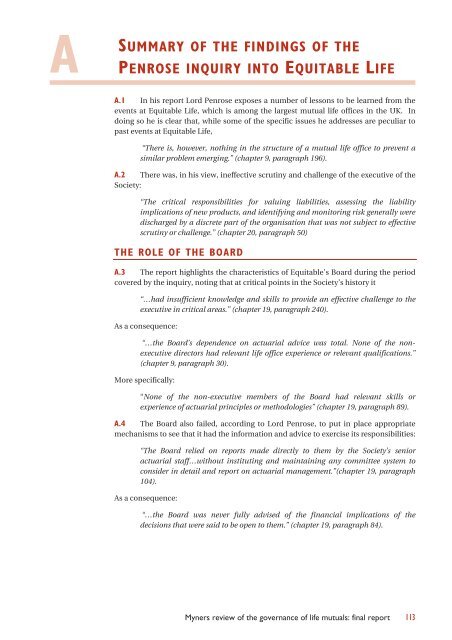
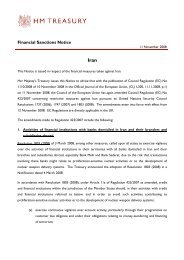
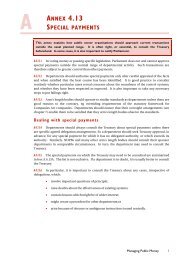
![AIRTO [Professor Dr Brian Blunden] - HM Treasury](https://img.yumpu.com/15492848/1/184x260/airto-professor-dr-brian-blunden-hm-treasury.jpg?quality=85)
